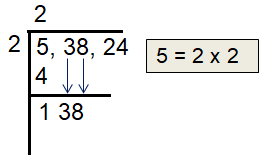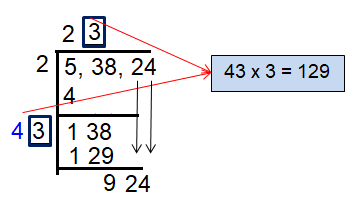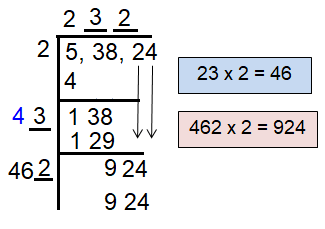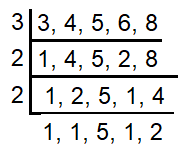CHECK IF THE GIVEN NUMBER IS PERFECT SQUARE
Subscribe to our ▶️ YouTube channel 🔴 for the latest videos, updates, and tips.
A perfect square is a number that can be expressed as the product of an integer by itself or as the second exponent of an integer.
To check if the given number is perfect square or not, we use the following ways.
(i) Long division
(ii) Using prime factorization.
Check if the Given Number is Perfect Square Using Long Division method :
Problem 1 :
Check if 53824 is a perfect square ?
Solution :
Using long division, let us check if the number is perfect square. Starting from the last digit, put comma for every two digits.
That is, 5, 38, 24
Decompose 5 as product of two same values.

Multiply the quotient 2 by 2, we get 4.
Put the same digit near 4 and near 2 at the quotient.

Now multiply the new quotient by 2 to get the next step.

Since the remainder is 0, we say 53824 is a perfect square.
Problem 2 :
Check if 294 is a perfect square, if it is not find the least number must be multiplied to make it a perfect square.
(a) 2 (b) 3 (c) 6 (d) 24
Solution :
Decomposing 294, we get

The given number 294 is not a perfect square.
From the prime factorization, it is clear in 7 we have two sevens. But we have only one 2 and 3. In order to make it as perfect square, we need one more 2 and one more 3.
294 = 2 x 3 x 7 x 7
To make it as perfect square,
294 = 2 x 3 x 7 x 7 x 2 x 3
So, the required number is 6.
Problem 3 :
The least perfect square number divisible by 3, 4, 5, 6 and 8 is
(a) 900 (b) 1200 (c) 2500 (d) 3600
Solution :
Since the required number is divisible by 3, 4, 5, 6 and 8, it should be the multiple of all.
To find the least number which is divisible by all above, we find the least common multiple of all.

LCM (3, 4, 5, 6, 8) = 120
The required number should be a multiple of 120
(a) 900 is not a multiple of 120 even though it is perfect square.
(b) 1200 is not a perfect square.
(c) 2500 is a perfect square but not a multiple of 120.
(d) 3600 is a perfect square as well multiple of 120.
So, option d is correct.
Problem 4 :
The least perfect square, which is divisible by each of 21, 36 and 66 is
(a) 213444 (b) 214344 (c) 214434 (d) 231444
Solution :
21 = 3 x 7
36 = 32 x 22
66 = 2 x 3 x 11
LCM (21, 36, 66) = 32 x 22 x 7 x 11
= 2772
To make this least common multiple as perfect square, we need one 7 and one 11.
2772 = 32 x 22 x 7 x 11 x (7 x 11)
2772 x 77 ==> 213444
So, option a is correct.
Subscribe to our ▶️ YouTube channel 🔴 for the latest videos, updates, and tips.
Recent Articles
-
Finding Range of Values Inequality Problems
May 21, 24 08:51 PM
Finding Range of Values Inequality Problems -
Solving Two Step Inequality Word Problems
May 21, 24 08:51 AM
Solving Two Step Inequality Word Problems -
Exponential Function Context and Data Modeling
May 20, 24 10:45 PM
Exponential Function Context and Data Modeling